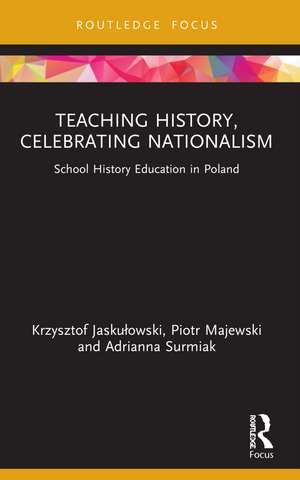Teaching History, Celebrating Nationalism: School History Education in Poland
Autor Krzysztof Jaskułowski, Piotr Majewski, Adrianna Surmiaken Limba Engleză Paperback – 31 mai 2023
| Toate formatele și edițiile | Preț | Express |
|---|---|---|
| Paperback (1) | 185.18 lei 6-8 săpt. | |
| Taylor & Francis – 31 mai 2023 | 185.18 lei 6-8 săpt. | |
| Hardback (1) | 461.66 lei 6-8 săpt. | |
| Taylor & Francis – 2 aug 2021 | 461.66 lei 6-8 săpt. |
Preț: 185.18 lei
Nou
Puncte Express: 278
Preț estimativ în valută:
35.45€ • 38.51$ • 29.79£
35.45€ • 38.51$ • 29.79£
Carte tipărită la comandă
Livrare economică 22 aprilie-06 mai
Preluare comenzi: 021 569.72.76
Specificații
ISBN-13: 9781032113166
ISBN-10: 1032113162
Pagini: 106
Dimensiuni: 138 x 216 x 6 mm
Greutate: 0.14 kg
Ediția:1
Editura: Taylor & Francis
Colecția Routledge
Locul publicării:Oxford, United Kingdom
ISBN-10: 1032113162
Pagini: 106
Dimensiuni: 138 x 216 x 6 mm
Greutate: 0.14 kg
Ediția:1
Editura: Taylor & Francis
Colecția Routledge
Locul publicării:Oxford, United Kingdom
Public țintă
Postgraduate and UndergraduateCuprins
1. Setting the ground 2. Nationalism, collective memory, education 3. Teaching history, celebrating nationalism 4. Nationalism, but what kind? 5. Whose nation? Whose history? 6. What next for teaching history?
Notă biografică
Krzysztof Jaskułowski is Associate Professor at SWPS University of Social Sciences and Humanities, Poland, and the author of The Everyday Politics of Migration Crisis in Poland: Between Nationalism, Fear and Empathy.
Piotr Majewski is Assistant Professor at SWPS University of Social Sciences and Humanities, Poland.
Adrianna Surmiak is Assistant Professor in the Department of Sociology of Morality and General Axiology at the University of Warsaw, Poland.
Piotr Majewski is Assistant Professor at SWPS University of Social Sciences and Humanities, Poland.
Adrianna Surmiak is Assistant Professor in the Department of Sociology of Morality and General Axiology at the University of Warsaw, Poland.
Descriere
This book analyses the relationship between history education and nationalism in the context of the dominant structures of collective memory in Poland. Drawing on original qualitative research with teachers, it explores the ways in which teachers understand the aims of history teaching and how they teach history.
